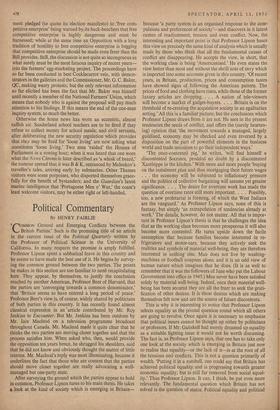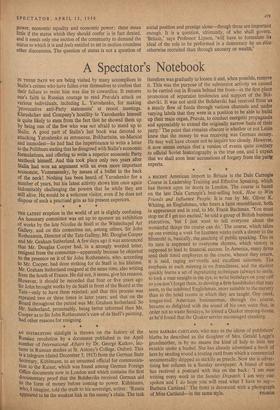Political Commentary
By HENRY FAIRLIE griOMMON Ground and. Emerging Conflicts between the British Parties.' Such is the promising title of an article in the current issue of the Political Quarterly written by the Professor of Political Science in the University of California. In, many respects the promise is amply fulfilled. Professor Lipson spent a sabbatical leave in this country and he seems to have made the best use of it. He begins.by survey- ing the common ground between the two parties. The points he makes in this section are too familiar to need recapitulating here. They appear, by themselves, to justify the conclusion reached by another American, Professor Beer of Harvard, that the parties are 'converging towards a common denominator,' that 'Britain seems to have entered a long period of peace.' Professor Beer's view is, of course, widely shared by politicians of both parties in this country. It has recently found almost classical expression in an 'article contributed by Mr. Roy Jenkins to Encounter. But Mr. Jenkins has been outdone by Mr. Iain Macleod on a television programme broadcast throughout Canada. Mr. Macleod made it quite clear that he thinks the two parties are moving closer together and that the process satisfies him. When asked who, then, would provide the opposition ten years hence, he shrugged his shoulders, said that he did not know and obviously thought the matter of little interest. Mr. Macleod's reply was most illuminating, because it underlines the fact that those who are content that the parties should move closer together are really advocating a well- managed but one-party state. After surveying the ground which the parties appear to hold in common, Professor Lipson turns to his main thesis. He takes a look at the kind of society which is emerging in Britain— because 'a party system is an organised response to the com- pulsions and preferences of society'—and discovers in it latent causes of readjustment, tension and even conflict. Now, the interesting and important point is that Professor Lipson bases this view on precisely the same kind of analysis which is usually made by those who think that all the fundamental causes of conflict are disappearing. He accepts the view, in short, 'that the working class, is being 'Americanised.' He even states the view better than most and without the shrill note of envy which is imported into some accounts given in this country. 'Of recent years, in Britain, production, prices and consumption tastes have showed signs of following the American pattern. The prices of food and clothing have risen, while those of the former luxury articles are dropping. . . . A nation of tele-viewers will become a market of gadget-buyers. . . . Britain is on the threshold of re-creating the acquisitive society in an egalitarian setting.' All this is a familiar picture; but the conclusions which Professor Lipson draws from it are not. He sees in the present tendencies the seeds of conflict, and offers the (surely hearten- ing) opinion that 'the movement towards a managed, largely guildised, economy may be checked and even reversed by a disposition on the part of powerful elements in the business world and trade unionism to go their independent ways.'
'The once-contented pig,' he writes, 'will find himself a discontented Socrates, prodded no doubt by a discontented Xanthippe in the kitchen.' With more and more people 'buying on the instalnient plan and thus mortgaging their future wages . . . the economy will be subjected to inflationary pressure and the politics of collective bargaining will assume yet greater significance. . . . The desire for overtime work has made the question of overtime rates still more important. . . . Possibly, too, a new proletariat is forming, of which the West Indians are the vanguard.' As Professor Lipson says, none of this is fantasy, but simply 'an extrapolation of tendencies already at work.' The details, however, do not matter. All that is impor- tant in Professor Lipson's thesis is that he challenges the idea that as the working class becomes more prosperous it will also become more contented. He turns upside down the facile assumption that because families become interested in re- frigerators and motor-cars, because they actively seek the realities and symbols of material well-being, they are therefore interested in nothing else. Man does not live by washing- machines or football coupons alone, and it is an odd view of human nature which imagines that he does. (It is as well to remember that it was the followers of Jane who put the Labour Government into office in 1945.) Men never have been satisfied solely by material well-being. Indeed, once their material well- being has been secured they are all the freer to seek the grati- fication of other desires. It is these desires which are making themselves felt now and are the source of future discontents.
This is why it is interesting to notice that Professor Lipson selects equality as the pivotal question round which all others are going to revolve. Once again it is necessary to emphasise that political issues cannot be thought up either by politicians or professors. If Mr. Gaitskell had merely dreamed up equality as a suitable fighting issue it would not be worth discussing. The fact is, as Professor Lipson says, that one has to take only one look at the society which is emerging in Britain just now to realise that equality—or the lack of it—is at the root of all the tensions and conflicts. This is not a question primarily of wealth. 'Putting it in a nutshell, one could say that Britain has achieved- political equality and is progressing towards greater economic equality, but is still far removed from social equal- ity.' Thus Professor Lipson. It can, I think, be put even more relevantly. The fundamental question which Britain has not solved is the question of status. Political equality and political power, economic equality and economic power: these mean little if the status which they should confer is in fact denied, and it needs only one section of the community to demand the status to which it is and feels entitled to set in motion countless other discontents. The question of status is not a question of social position and prestige alone—though these are important enough. It is a question, ultimately, of who shall govern. 'Britain,' says Professor Lipson, 'will have to formulate its ideal of the role to be performed in a democracy by an elite otherwise recruited than through ancestry or wealth.'











































 Previous page
Previous page